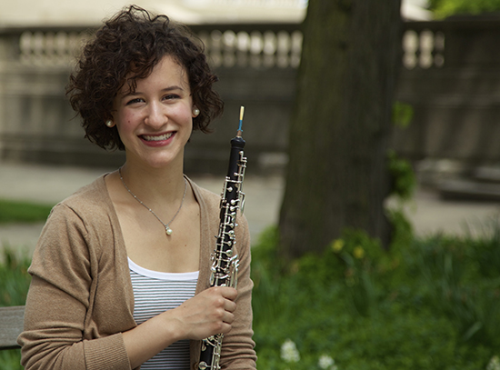Jun 19, 2013
Oboist seizes opportunities of musical offerings in Chicago and at DePaul
Oboist seizes opportunities of musical offerings in Chicago and at DePaul
Music runs in Adèle-Marie Buis’ blood. Her father is a musicology professor, and her mother conducts a church choir. Yet she had to deeply reflect on whether to pursue a career in the field.
It was only at the 11th hour that she decided to enroll in the School of Music at DePaul University, where she had been accepted after a successful audition. She seriously considered majoring in French at another university. But Eugene Izotov, principal oboist for the Chicago Symphony Orchestra (CSO), who had been giving Buis private oboe lessons while she was in high school, convinced her that DePaul and the musically rich city of Chicago would be the right environment in which her musical gifts could flourish.
“I spoke with Adèle-Marie and her parents and said, ‘You really have to give this a chance,’” said Izotov, who also is a faculty member in DePaul’s School of Music. “The potential is so great, but it’s a terrible risk because it takes it all out of you. Thankfully, the high level of her playing and success in recent graduate school and festival auditions demonstrate that it was the right path for Adèle-Marie."
The Russian-born Izotov said Buis has come a long way. “Her natural musicality is accompanied by the tremendous skills she acquired in the past four years at DePaul.” He believes she possesses the talent and determination to become a performer in one of the nation’s top orchestras. “As the saying goes, ‘You will never meet a greater adversary than your own potential.’ Adèle-Marie is very self-critical and is always working toward something better,” he said.
Buis continued to study with Izotov at DePaul and distinguished herself both in the classroom and on the stage as the co-principal oboist for the DePaul Symphony Orchestra and the co-principal oboist for the DePaul Wind Ensemble. Buis, raised in suburban River Forest, graduates magna cum laude with a Bachelor of Music degree in music performance in June.
“I’m very glad I went to DePaul,” said Buis. “There are so many opportunities in Chicago not only to perform but to see such great orchestras as the Chicago Symphony or the Lyric Opera. I also had the opportunity to go to school with some very musically talented students. And I learned from great faculty conductors like Cliff Colnot and Michael Lewanski and guest conductors like Daniel Boico (formerly of the New York Philharmonic).”
In the fall, she begins a graduate program in performance at the prestigious New England Conservatory of Music in Boston, the oldest independent school of music in the United States. Over the summer, she will perform at the Pacific Music Festival in Sapporo, Japan. Winning an international audition to perform at the classical music festival is a remarkable achievement, according to Izotov.
At DePaul, Buis took full advantage of all the options the school and the city offer an aspiring musician. One of her favorite experiences was performing a solo work as part of a recital at a DePaul fundraiser in the Gold Coast home of a donor. She was one of four students selected for the honor.
Outside of DePaul, she was the co-principal oboist for the Civic Orchestra of Chicago, where she also played the English horn, and she performed as a featured oboist with the Chicago Jazz Ensemble. At the Credo Chamber Music summer program at Oberlin College in Ohio, she performed Tchaikovsky’s Symphony No. 5. She also performed with members of the CSO.
Succeeding in the School of Music’s fast track requires shrewd time management, said Buis, who began playing oboe in fourth grade. On a typical day, she spent about three hours practicing her instrument and several more in rehearsal, not to mention other time spent on classwork and studying. Because she plays oboe, she also must devote time each week to making reeds for her woodwind instrument. The performer creates the sound by blowing into the reed, which is carefully crafted from a piece of bamboo.
“The oboe creates a gorgeous sound. Some say it evokes sadness,” Buis said. “It can certainly prompt an emotional response from the audience. I think I can do that with the oboe.”
She offered this bit of advice to a student considering a path like hers in the School of Music: “Practice a lot and practice well. Take advantage of all the opportunities at DePaul and in Chicago, and concentrate on what you love doing musically.”
Written by Edmund Lawler

Adèle-Marie Buis distinguished herself both musically and academically at DePaul. (Photo by Jon Cecero)
